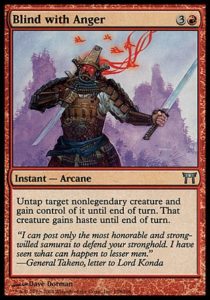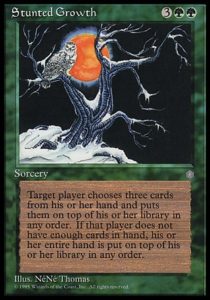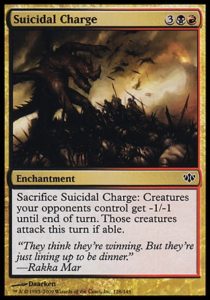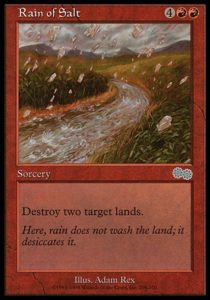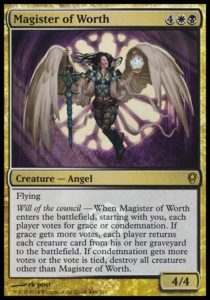The longer you play Magic, the more likely it is that you’ll hear or perhaps utter the following:
I Deserve To Lose
Can we please retire this phrase? It’s a toxic expression that foments frustration instead of venting it. It leads players to criticize themselves rather than reflect upon their own mistakes. It’s not merely complaining, it helps generate the exact conditions that caused the complaint in the first place.
Every time you make a mistake and say, “I deserve to lose,” you rob yourself of the opportunity to learn and recover from your (perceived) error. There’s an unreasonable expectation players cultivate: that their decisions and play must be perfect. Once they fall short of this standard, the game is lost (in their mind). This thought process has three major problems.
First, it is an unreasonable standard that everyone is certain to fall short of. Yes, anyone hoping to improve does so by striving toward more perfect (i.e. better) play. However, Magic is a deeply complicated game where games can be full of innumerable decisions, many of which can not even be perceived as having been choices (e.g. which land you play on your third turn, whether you’re consistently holding up the same mana to bluff a card). Magic is not ‘solved’ as Checkers and Tic Tac Toe are; there is no comprehensive understanding of all possible game states that would allow a player to make the statistically best play every time, nor is there a guarantee that Magic will ever be solved. Magic is a hard enough game that even the best players in the world make mistakes, even on camera at the Pro Tour. If they can’t be perfect in every game, all the time, how can we hold ourselves up to that standard?
Second, this line of thinking denies one the opportunity to grow from their mistakes. If perfection is the goal, every mistake is an opportunity to reflect on why it happened. Perhaps you have a tendency to get overly aggressive or defensive when the battlefield is cluttered; perhaps you stopped respecting a trick you’d been playing around; or perhaps you actually made the statistically best choice, but things didn’t go your way. You’ll never know why mistakes happen unless you think on them, but you won’t reflect on mistakes if they’re considered the cause of the loss, when they’re really an expression of their root cause.
Last, this thought process is self-defeating. It holds people up to an impossible standard, and when they inevitably fall short of it, they give up. A single mistake can, but often doesn’t, end a game. However, if one trains oneself to go on tilt whenever anything goes wrong, then even the smallest mistakes become fatal. In so doing, you’re not teaching yourself how to be a better Magic player: a great Magic player can recover from something not going the way they want and win. No, this attitude makes people into worse Magic players.
An even worse expression of this phrase is the more aggressive:
You Deserve To Lose
Or the more indirect:
They Deserved To Lose
Too often do people get angry and attack their opponent as the cause of their loss. Their opponent got ‘lucky,’ or won despite (seemingly) sub-optimal play, or ‘didn’t’ deserve their pool.’ Let’s first and foremost acknowledge this for what it is: abuse. These words do nothing but hurt and do nothing to help you win or make your day better. Blaming one’s opponent denies you the opportunity to consider what you could have done better.
Those who blame others tend to assume that they played perfectly, which is rarely the case (in my opinion, the only ‘perfect games’ the vast majority of us ever play are when we mulligan to oblivion and have few decisions more complicated than “do I play a land, or do I not play a land?”). They think as though their opponent had complete knowledge of their hand and deck. They fail to think about what they themselves could have done differently, or why their opponents made the apparent mistakes they did.
If you suspect your opponent is making mistakes, rather than complain about it, ask yourself why they’re in error. Try to recognize the pattern behind the mistakes and capitalize on it. If they really are making mistakes, that’s an opportunity for you. If a game seems to come down to terrible luck on your part, even if it seems impossible to win in retrospect, think about what the important decisions you made along the way were. How could you have won with a slightly more favorable distribution of cards or usage of bluffing? Remember that while your opponent is a factor that’s not under your control, your play is.
At the end of the day, there’s very little that Magic players uniquely deserve. You don’t deserve to open a bomb mythic rare. You don’t deserve to open money. You don’t deserve to draw your ideal opening hand. You don’t deserve to always keep a seven card hand or win the die roll. You don’t deserve the person’s pool you’re registering, no matter how much better it is than your pool. You don’t deserve to make top eight, to win, or to get more prize packs. People feel entitled to these things, but no one is.
What players are entitled to is mutual respect, the opportunity to be intellectually challenged and have fun, and a comfortable, safe space to play Magic. A sense of self-entitlement ruins this experience, both for you and everyone such toxic mentality touches.
So, the next time you feel indignant, either about your own mistakes or your opponent’s or your own luck or someone else’s, relax. While it’s easy to give up, blame bad luck, or criticize your opponent, it’s much more productive to focus on how you can overcome a difficult situation, or learn from falling short of your expectations in order to do better the next time.
—Zachary Barash
Zachary Barash is a New York-based game designer. Playing since 1994, he loves Limited and drafts every available format (including several that aren’t entirely meant to be drafted). His favorite contemporary Magic design is Explore, because it’s a Time Walk cast for minimal value.

